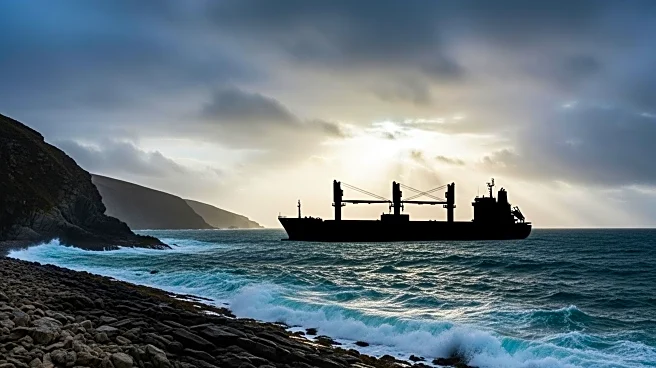What's Happening?
Ukraine's Ministry of Foreign Affairs has expressed strong condemnation towards China following revelations that a Chinese-owned containership has been operating in Russian-occupied Crimea. The Financial Times reported that the vessel, Heng Yang 9, has made multiple trips to Crimea, despite international sanctions imposed in 2014 that prohibit shipping activities in the region. Ukraine has filed an official protest with China's foreign ministry and notified the International Maritime Organization, accusing China of disregarding Ukraine's sovereignty. The containership, which changed ownership in 2024 and is now registered in Panama, has reportedly falsified its tracking data to conceal its movements in the Black Sea.
Why It's Important?
This development underscores the ongoing geopolitical tensions surrounding Crimea, a region annexed by Russia in 2014, leading to international sanctions. Ukraine's protest highlights the complexities of international maritime law and the challenges in enforcing sanctions. The operation of the Heng Yang 9 in Crimea could potentially exacerbate diplomatic relations between Ukraine and China, and further strain China's relations with Western countries that support Ukraine's sovereignty. The incident also raises concerns about the integrity of maritime tracking systems and the potential for vessels to evade international regulations.
What's Next?
Ukraine is urging China to take immediate measures to prevent further violations, although China has historically not recognized Western sanctions. The situation may prompt further diplomatic discussions or actions from international bodies like the International Maritime Organization. Additionally, the incident could lead to increased scrutiny of shipping activities in the Black Sea and efforts to enhance tracking and enforcement mechanisms to prevent similar occurrences.
Beyond the Headlines
The operation of the Heng Yang 9 in Crimea may have broader implications for international trade routes and the enforcement of sanctions. It highlights the challenges faced by countries in maintaining sovereignty and the potential for economic activities to undermine political stances. The situation also reflects the strategic importance of Crimea in regional trade and the ongoing impact of geopolitical conflicts on global commerce.










